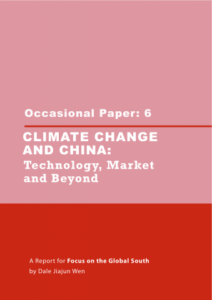06/06/2009
Under: Climate & Environment, Publications
China plays an important role of representing the interests of developing countries in the current climate change negotiations through the mechanism of 77+China. As the most important emitter in developing countries it is facing an enormous challenge to fulfill its international obligations to reduce its CO2 emissions, while at the same time address its domestic responsibilities to meet the human development needs of hundreds of millions of its people that are still living in poverty.
As the “world’s factory”, it has taken up and still taking the carbon emission of other countries. It is estimated that between seven to fourteen percent of carbon emission in China is actually from producing products for American consumers. Almost every cheap articles – clothes, shoes, appliances, computers, etc. that we, from the rest of the world, also buy are from China. The climate change negotiations and the current financial crisis pushed China to the center stage of world diplomacy.
This occasional paper contributes to the international debate on climate change and the global search for climate justice. The critical UN Conference on Climate Change in Copenhagen in December 2009 will bring back the focus on the need for a climate governance regime. The complexities of the issues and the requirements of genuine and sustainable solutions are vast. The current financial crisis that is now affecting both developed and developing countries alike is putting additional difficulties in mobilizing political will to come up and implement strategic climate and energy policies that will answer climate, economic, social, energy and security challenges.
This paper discusses the impacts of climate change to the environment of China and most especially to the livelihood of Chinese people there. It analyzed the Chinese government’s position and enumerates the measures that China has taken so far, as well as the commitments and concrete targets that it pledged to undertake. It explains China’s stance on the climate change negotiations; its arguments and considerations concerning its role to the international community; and its responsibilities to address its many domestic pressures in relation to geopolitics, the financial crisis, as well as global trade and technology issues.
Many people in China think that the increasing pressures brought by climate change to the environment offer an opportunity to tackle its own environmental problems. Some also view the need to seriously link climate issues with the problems connected with the development path that it has taken in the last few decades. The author also described and analyzed the current thinking of experts and the public alike, the various positions of civil society organizations inside China and the various initiatives that they are undertaking to inform people about climate change issues and mobilize their opinions.
Focus on the Global South will contribute to local and international discourse on the role of China in climate and energy issues through series of publications, teach-ins, conferences and dialogues. We will bring together experts and various concerned individuals to explore the potential for climate and energy justice to address the many challenges of climate change and reverse this disastrous process.
Dorothy Grace Guerrero
Coordinator, China Programme
Focus on the Global South






